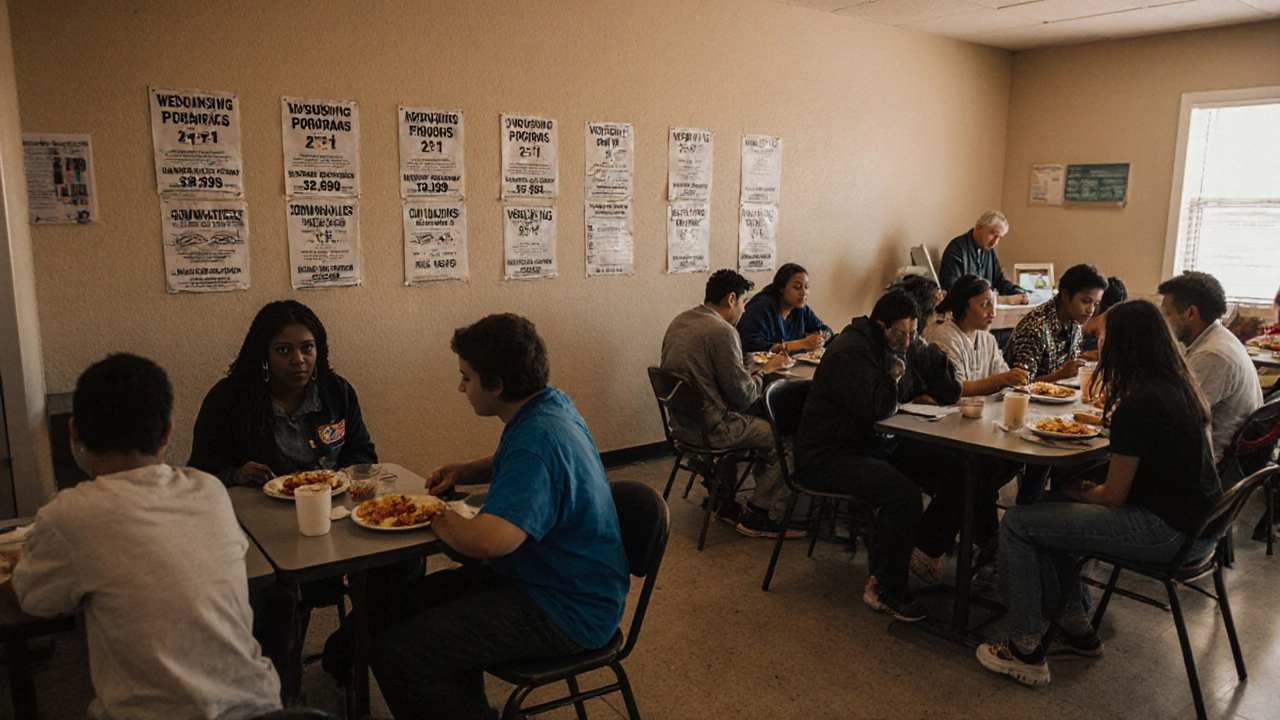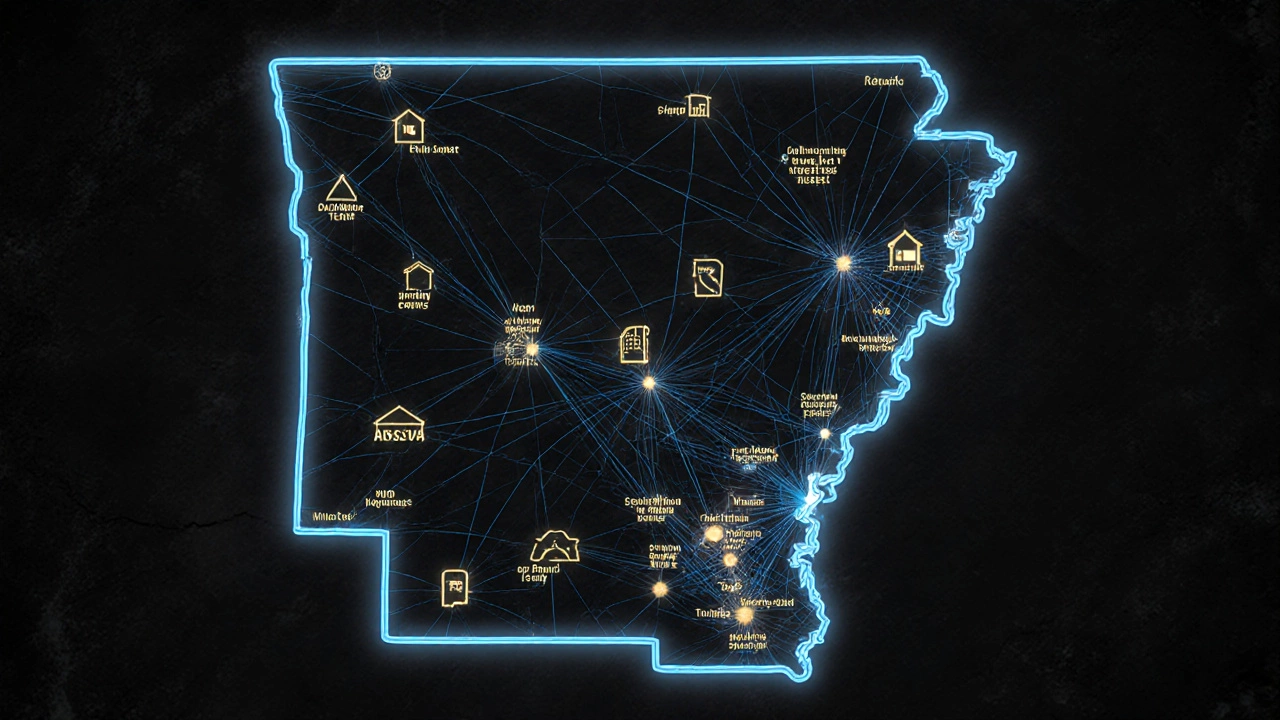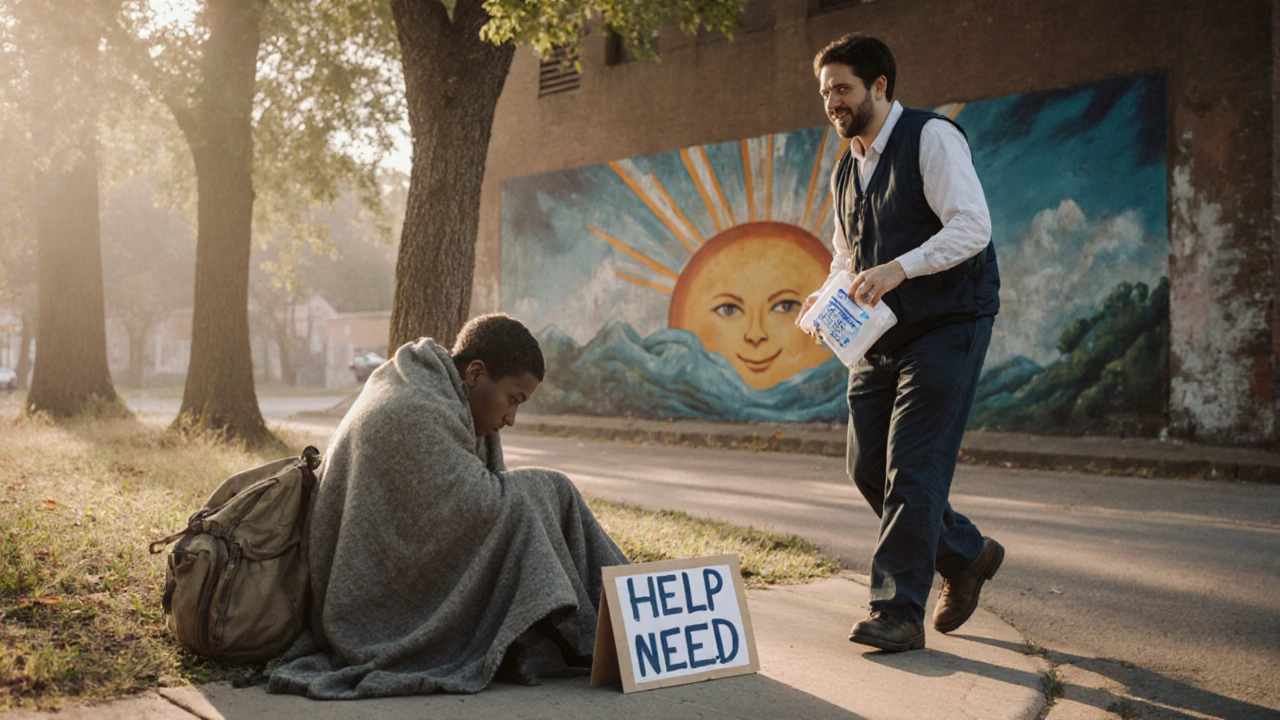Arkansas Homelessness Services Finder
Find Help Near You
This tool identifies services available based on your location and immediate needs. All services are free and confidential.
💡 What you need now
Available Services
Next Steps
Call 2-1-1 immediately for personalized assistance. Our partners in your county have real-time availability.
📞 Dial 2-1-1 NowIf you're living on the streets in Arkansas or helping someone who is, you’ve probably asked: Is there a homeless grant that can actually help? The short answer is yes-but it’s not one single check you can apply for like a federal benefit. The Arkansas homeless grant isn’t a program with a name you can Google and click ‘Apply.’ It’s a mix of state-funded aid, federal dollars, and nonprofit resources all working together to get people off the streets. This guide cuts through the confusion and shows you exactly what’s available, who qualifies, and how to get help right now.
What the Arkansas Homeless Grant Actually Is
There’s no official program called the ‘Arkansas Homeless Grant.’ That name is often used by people trying to simplify things, but the real system is made up of several different funding streams. Most of the money comes from the U.S. Department of Housing and Urban Development (HUD), which gives Arkansas over $12 million a year for homeless services. That money doesn’t go directly to individuals. Instead, it flows to local agencies-like shelters, outreach teams, and housing nonprofits-that use it to pay for emergency shelter, rental help, case management, and job training.
For example, in 2024, the Arkansas Coalition to End Homelessness received $3.1 million from HUD’s Continuum of Care program. That’s the largest single source of funding for homeless services in the state. That money helped over 8,000 people find housing or stay off the streets. So when people say ‘Arkansas homeless grant,’ they’re really talking about this network of programs.
Who Can Get Help?
You don’t need to be a U.S. citizen to qualify for most services. You don’t need to have a job. You don’t even need to have an ID-though having one helps. The only real requirement is that you’re experiencing homelessness or are at immediate risk of losing your home.
That includes:
- People sleeping in cars, tents, or abandoned buildings
- Families with kids who’ve been evicted
- Veterans living on the streets
- Teens and young adults kicked out of their homes
- People fleeing domestic violence
- Those with mental illness or addiction who can’t afford housing
There’s no income cap. Even if you’re working part-time but still can’t afford rent, you qualify. The system is built to help people who are struggling, not those who are just barely getting by.
What Kind of Help Is Available?
The services you can get depend on where you are in the state, but here’s what’s commonly offered:
- Emergency shelter - Free beds, meals, and showers at shelters in Little Rock, Fayetteville, Fort Smith, and other cities. Some shelters offer gender-specific or family units.
- Rental assistance - One-time or short-term payments to cover rent, utilities, or security deposits. This is the most effective way to prevent homelessness.
- Case management - A worker who helps you apply for Medicaid, find a job, get ID documents, or access mental health care.
- Transitional housing - Apartments or group homes with support services for up to two years while you get back on your feet.
- Permanent supportive housing - Long-term housing with on-site counseling for people with chronic health issues or disabilities.
- Outreach teams - Workers who go into encampments and downtown areas to connect people with services. They carry blankets, hygiene kits, and phone numbers for help.
In 2023, over 2,300 Arkansans received rental assistance through these programs. More than 1,100 people moved from shelters into permanent housing. These aren’t just numbers-they’re real people who got their lives back.

How to Apply for Help
You don’t apply for a ‘grant.’ You call or walk into a local service provider. Here’s how:
- Call 2-1-1 - This is Arkansas’s free, 24/7 helpline. Just dial 2-1-1 from any phone. A live operator will connect you to the nearest homeless service agency in your county.
- Visit a local shelter - Even if you’re not staying there, shelters have staff who can help you apply for services. They know which programs have open slots.
- Go to a community health center - Many clinics, like those run by the Arkansas Department of Health, have social workers who handle housing applications.
- Check the Arkansas Coalition to End Homelessness website - They list every funded program in the state with contact info.
Don’t wait for a letter or an online form. These programs work on a first-come, first-served basis. The sooner you reach out, the sooner you get help.
Common Myths About the Arkansas Homeless Grant
There’s a lot of misinformation out there. Let’s clear up the biggest lies:
- Myth: You need to be sober to get help. Truth: You can get shelter and housing even if you’re still using drugs or alcohol. Recovery support is offered, but it’s not required to get a bed.
- Myth: The government gives you a check to buy a house. Truth: No one gets a lump sum. Money goes directly to landlords or service providers to cover rent, utilities, or case management.
- Myth: You have to prove you’ve been homeless for years. Truth: Even one night without a safe place to sleep qualifies you.
- Myth: Only families get help. Truth: Single adults, veterans, teens, and seniors all qualify.
What If You’re Turned Away?
Some agencies run out of funds. Others have waiting lists. If you’re told ‘no,’ don’t give up. Here’s what to do next:
- Call 2-1-1 again and ask for a different provider. Some nonprofits have more funding than others.
- Visit the Arkansas Department of Human Services website. They have a list of emergency housing resources by county.
- Reach out to faith-based groups. Churches, mosques, and synagogues often have small funds for rent help or utility bills.
- Ask if you can be added to a waiting list. Many programs have openings within weeks, not months.
One woman in Pine Bluff was turned away by three shelters before a volunteer at a food bank connected her with a housing nonprofit. Within 11 days, she had a studio apartment and a case manager. Her story isn’t rare-it’s typical of how the system works when you keep pushing.

Where the Money Comes From
Arkansas’s homeless funding comes from three main places:
- HUD - Over $12 million annually, distributed through local Continuum of Care programs.
- State funds - Arkansas allocates $2.5 million each year from its general fund for emergency housing and prevention.
- Private donors - Foundations, churches, and individual donors give millions more, especially during winter months.
None of this money is used for administrative bloat. By law, at least 85% of HUD funds must go directly to services. Most nonprofits spend 90% or more on housing, food, and support.
How You Can Help
If you’re not experiencing homelessness but want to make a difference:
- Donate to the Arkansas Coalition to End Homelessness or your local shelter.
- Volunteer your time-sorting clothes, serving meals, or driving people to appointments.
- Advocate. Call your state representative and ask them to support funding for housing programs.
- Spread the word. Tell people about 2-1-1. Many don’t know it exists.
Helping isn’t about fixing someone else’s life. It’s about giving someone the chance to fix it themselves.
Is there a direct cash grant for homeless people in Arkansas?
No, Arkansas does not give direct cash payments to homeless individuals. All funding goes through approved nonprofits, shelters, or housing agencies to pay for rent, utilities, shelter stays, or case management services. This prevents misuse and ensures help goes to actual housing needs.
Can undocumented immigrants get help with homelessness in Arkansas?
Yes. Federal and state homeless assistance programs do not require proof of citizenship. Shelters, food, medical care, and housing support are available to anyone experiencing homelessness, regardless of immigration status. Service providers are not required to report immigration status.
How long does it take to get housing assistance?
It varies. Emergency shelter is usually available the same day. Rental assistance or transitional housing can take days to weeks, depending on funding availability. Some programs have waiting lists, but many have open slots-especially if you call early in the week and follow up.
Do I need an ID to get help?
No, you don’t need an ID to get a bed or a meal. But to get rental assistance or permanent housing, you’ll eventually need some form of identification. Many agencies can help you get a free state ID or birth certificate if you don’t have one.
What if I’m living in my car-is that considered homelessness?
Yes. Living in your car, tent, or any place not meant for human habitation counts as homelessness under federal and Arkansas state definitions. You qualify for the same services as someone sleeping on the street.
Can I get help if I have a criminal record?
Yes. Most housing programs in Arkansas do not screen out people based on criminal history. Some landlords might, but nonprofit housing providers are trained to work with people returning from incarceration. Case managers can help you find landlords who accept tenants with records.
Next Steps: What to Do Today
If you or someone you know needs help, here’s your action plan:
- Dial 2-1-1 right now. It’s free, confidential, and available 24/7.
- Write down the name and number of the agency they connect you with.
- Go there tomorrow-even if you’re not ready. Just show up. Staff are used to helping people who feel overwhelmed.
- Ask if you can be added to any waiting lists. Don’t assume you’re too late.
- Keep calling back every few days. Programs open up unexpectedly.
Homelessness isn’t a personal failure. It’s a system failure-and the system has tools to fix it. You just have to reach for them.





